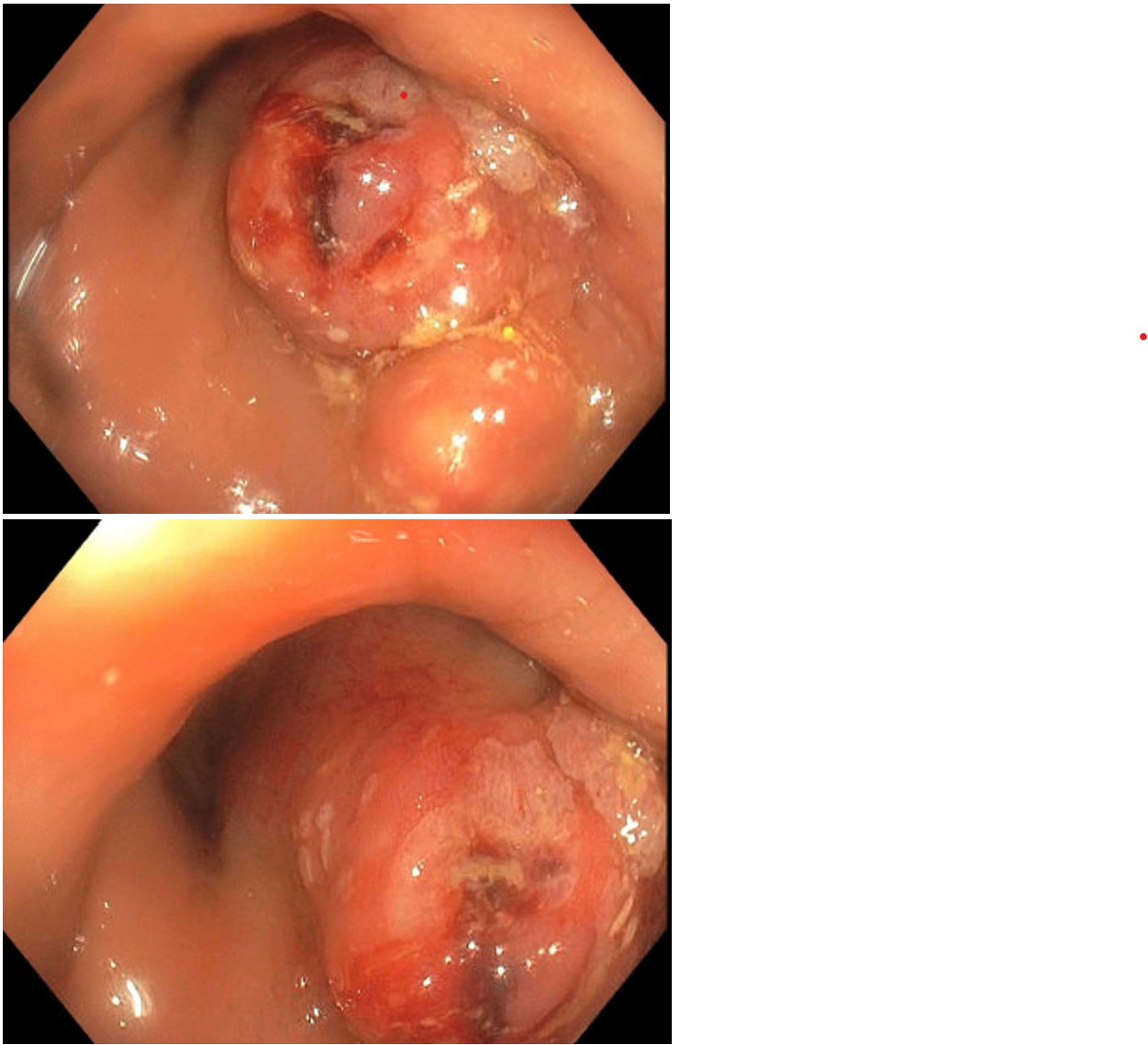Sunday Poster Session
Category: Colon
P0368 - A Rare Case of Metastatic Squamous Cell Carcinoma of the Rectum
Sunday, October 26, 2025
3:30 PM - 7:00 PM PDT
Location: Exhibit Hall
- BP
Bishal Paudel, MD
University of Florida
Gainesville, FL
Presenting Author(s)
Bishal Paudel, MD1, Ahmed Al Qady, MD1, Antonios Sapounas, MD2
1University of Florida, Gainesville, FL; 2Malcom Randall Veterans Affairs Medical Center, Gainesville, FL
Introduction: Squamous cell carcinoma (SCC) of the rectum is an exceptionally rare cancer, representing just 0.3% of rectal malignancies. This tumor is composed of malignant squamous cells that arise within the rectal mucosa. Unlike the common rectal adenocarcinoma, the pathogenesis, prognosis and therapeutic management is not well defined for primary SCC of the rectum.
Case Description/
Methods: A 43-year-old female with past medical history of Hepatitis C infection(treated), mood disorder, substance use disorder and pulmonary embolism presented to gastroenterology clinic with right lower quadrant abdominal pain. The patient was recently seen in an emergency department where a non-contrast CT of the abdomen and pelvis showed slightly irregular appearance of the rectum and large stool burden. Physical exam was pertinent for palpable, firm, fixed, and nodular lesion in the rectum. MRI Pelvis with and without contrast showed large peripherally enhancing and centrally necrotic mass with extensive mass effect along the right lateral, mid and low rectal wall measuring approximately 4.8 cm X 5.5 cm X 6 cm.
The patient underwent colonoscopy that showed fungating, polypoid, and ulcerated rectal mass 3 cm from the anal verge. Biopsies were taken for histology. Pathology resulted as invasive SCC. She underwent a pelvic exam with a normal pap smear ruling out gynecological origin of SCC. After tumor board discussion, she was deemed to be a candidate for chemoradiation (5-fluorouracil and mitomycin with concomitant external radiotherapy). She was lost to follow-up and was later found to have liver metastases. Liver biopsy demonstrated metastatic squamous cell carcinoma. The patient eventually opted for hospice care.
Discussion: SCC of the rectum is exceedingly rare with limited consensus on optimal management. The pathogenesis remains unclear although there is some evidence linking its association with chronic inflammation, high-risk human papilloma virus infection and prior radiation therapy. Prompt diagnosis, multidisciplinary approach, and close follow-up are essential in management of this aggressive cancer.

Figure: Figure A: Rectal Mass
Disclosures:
Bishal Paudel indicated no relevant financial relationships.
Ahmed Al Qady indicated no relevant financial relationships.
Antonios Sapounas indicated no relevant financial relationships.
Bishal Paudel, MD1, Ahmed Al Qady, MD1, Antonios Sapounas, MD2. P0368 - A Rare Case of Metastatic Squamous Cell Carcinoma of the Rectum, ACG 2025 Annual Scientific Meeting Abstracts. Phoenix, AZ: American College of Gastroenterology.
1University of Florida, Gainesville, FL; 2Malcom Randall Veterans Affairs Medical Center, Gainesville, FL
Introduction: Squamous cell carcinoma (SCC) of the rectum is an exceptionally rare cancer, representing just 0.3% of rectal malignancies. This tumor is composed of malignant squamous cells that arise within the rectal mucosa. Unlike the common rectal adenocarcinoma, the pathogenesis, prognosis and therapeutic management is not well defined for primary SCC of the rectum.
Case Description/
Methods: A 43-year-old female with past medical history of Hepatitis C infection(treated), mood disorder, substance use disorder and pulmonary embolism presented to gastroenterology clinic with right lower quadrant abdominal pain. The patient was recently seen in an emergency department where a non-contrast CT of the abdomen and pelvis showed slightly irregular appearance of the rectum and large stool burden. Physical exam was pertinent for palpable, firm, fixed, and nodular lesion in the rectum. MRI Pelvis with and without contrast showed large peripherally enhancing and centrally necrotic mass with extensive mass effect along the right lateral, mid and low rectal wall measuring approximately 4.8 cm X 5.5 cm X 6 cm.
The patient underwent colonoscopy that showed fungating, polypoid, and ulcerated rectal mass 3 cm from the anal verge. Biopsies were taken for histology. Pathology resulted as invasive SCC. She underwent a pelvic exam with a normal pap smear ruling out gynecological origin of SCC. After tumor board discussion, she was deemed to be a candidate for chemoradiation (5-fluorouracil and mitomycin with concomitant external radiotherapy). She was lost to follow-up and was later found to have liver metastases. Liver biopsy demonstrated metastatic squamous cell carcinoma. The patient eventually opted for hospice care.
Discussion: SCC of the rectum is exceedingly rare with limited consensus on optimal management. The pathogenesis remains unclear although there is some evidence linking its association with chronic inflammation, high-risk human papilloma virus infection and prior radiation therapy. Prompt diagnosis, multidisciplinary approach, and close follow-up are essential in management of this aggressive cancer.

Figure: Figure A: Rectal Mass
Disclosures:
Bishal Paudel indicated no relevant financial relationships.
Ahmed Al Qady indicated no relevant financial relationships.
Antonios Sapounas indicated no relevant financial relationships.
Bishal Paudel, MD1, Ahmed Al Qady, MD1, Antonios Sapounas, MD2. P0368 - A Rare Case of Metastatic Squamous Cell Carcinoma of the Rectum, ACG 2025 Annual Scientific Meeting Abstracts. Phoenix, AZ: American College of Gastroenterology.
